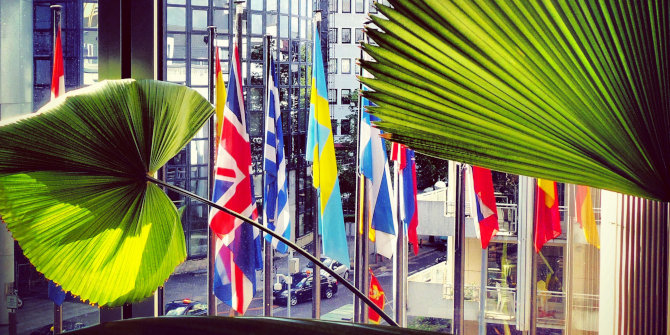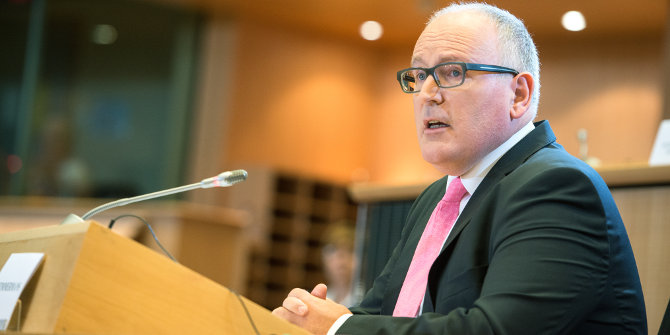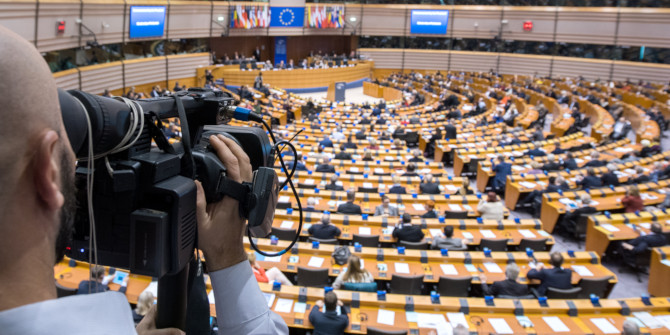The EU is often credited with having aided the Northern Ireland peace process in the leadup to the 1998 Good Friday Agreement. Giada Lagana argues the EU should now draw on this experience as it seeks to manage the implications of Brexit.
Brexit poses unprecedented political, economic and diplomatic challenges to the relationship that has developed between the Republic of Ireland and the United Kingdom over Northern Ireland in the past few decades. Since the Brexit process began, the EU has placed strong emphasis on protecting the Good Friday Agreement, which has resulted in the controversial implementation of the Northern Ireland Protocol. The EU has maintained its enduring commitment to peacebuilding in the region, which is aligned with its broader approach in this field.
Peacebuilding is at the heart of the EU’s very existence. In the 1992 Maastricht Treaty, the Community specified for the first time several objectives on which it has since remained firm. These include conflict resolution, as well as strengthening international security, promoting regional cooperation, the rule of law and human rights guided by ‘the principles which have inspired its own creation, development and enlargement’.
Recent scholarly and political interest in the EU’s ambition to become a global peacebuilder has rarely considered or labelled the strategic actions developed around the Northern Ireland Protocol as part of a peacebuilding effort. Most of the discussions focus on the ‘high politics’, on economics, and on the polarisation of public opinion in Northern Ireland, failing somewhat to tie the new arrangements to the historical role of the EU in the peace process.
This is partly due to the tendency to conceptualise the role of the EU as marginal, with Northern Ireland peacebuilding actors viewed as passive takers of opportunities and EU financial packages. Nevertheless, examples and evidence exist that prove how the origins of the EU’s peacebuilding approach can be traced to Northern Ireland. It emerged as the result of the strategic interaction between European strategies and structures and the actions of politicians and representatives pursuing their own political visions within the European arena.
It is evident from this viewpoint that the role of the EU in the Northern Ireland peace process is of symbolic significance. New evidence shows how the Community has deployed a new strategic framework to facilitate interdependence, dialogue, and reconciliation in Northern Ireland, and on the island of Ireland as a whole. The EU toolbox included connecting actors and places across territorial borders and levels encompassing European, Irish and British national and subnational institutions in different ways. What, then, can the experience of the Northern Ireland peace process teach EU negotiators who are now dealing with the consequences of Brexit?
The present commitment of the EU to protect all the dimensions of the Good Friday Agreement may be highly laudable, but it is also extremely ambitious.
A full historical analysis of the role of the EU in the Northern Ireland peace process provides a number of lessons. First, one of the most important features of the EU peacebuilding strategy for Northern Ireland was adopting the state as its vehicle for peacebuilding. By promoting an Anglo-Irish joint approach to conflict resolution, the EU showed a high level of understanding of the ethno-national and territorial causes of the conflict.
This shows the necessity for the EU to identify the type of state that can filter the new arrangements. It is also necessary to understand what type of state is envisaged by all stakeholders, with an emphasis on the views of the least powerful. This might also mean that, for the Northern Ireland Protocol to work as intended, there is an imperative need to define more clearly Northern Ireland’s status at the edges of the EU.
Second, the strategic approach adopted by the EU in Northern Ireland engaged with the complex, geopolitical, economic, and cultural realities via a range of networks and institutions that shared the will to directly deal with the root causes of the conflict. Consequently, the EU PEACE programmes, in particular, focused on the creation and nurturing of multilevel and constructive human relationships, rather than merely instrumental and technical responses to the conflict. The latter were left to ‘high politics’.
The PEACE programmes were (and are) a unique instrument in this sense. They have worked in tandem with the new institutions created by the Good Friday Agreement and which have engaged reflexively with the most, as well as the least, marginalised people in a post-violent Northern Ireland. In the current political context, PEACE Plus (which has received only marginal political and scholarly attention) should work in tandem with the Protocol to facilitate vertical and horizontal cooperation among all the actors involved, thus creating new dynamics that include a combination of British-Irish coordination, civil society, and peacebuilding networks.
Such cooperation would assure governments that they will still be in charge of running the large-scale bureaucracies that regulate social and economic life, but it would include the grassroots level in the peace as well as the political process. Facilitating, managing, directing, and institutionalising interactive forms of governance and related peace initiatives has been a successful approach in the past for promoting peace and protecting the Good Friday Agreement.
Third, the EU has shown a significant level of adaptability to the context of the peace process in Northern Ireland. The evolution over the years of many contextual elements linked to the political environment highlighted the need for EU peacebuilding to respond to the challenges of change and to its own failings. This meant modifying and simultaneously reinventing peacebuilding initiatives through the many networks and institutions that grew up around it. This suggests that the Protocol needs to be flexible and should be highly context-specific. This could serve governance networks, as well as EU political actors, in their work to help new British-Irish and Ireland-EU socio-spatial arrangements to peacefully survive the challenge of time.
The past shows how EU peacebuilding connected the localised conditions and contexts of the Northern Ireland peace process with European and institutional strategies. The present commitment of the EU to protect all the dimensions of the Good Friday Agreement may be highly laudable, but it is also extremely ambitious. The British-Irish relationship is now one of an EU member state and a third country. The north-south relationship is across an external border of the EU.
Unionists and nationalists have to share power across an even wider political divide, with nationalists having overwhelmingly voted Remain, and unionists mostly to Leave. Worryingly for human rights organisations and activists, the European Charter of Fundamental Rights is no longer incorporated into UK law. This is the scale of the challenge to be met by the Protocol – a never-before seen framework that, it shouldn’t be forgotten, represents a peacebuilding effort by the EU in Northern Ireland.
Note: This article gives the views of the author, not the position of EUROPP – European Politics and Policy or the London School of Economics. Featured image credit: Pippa Fowles / No 10 Downing Street (CC BY-NC-ND 2.0)





